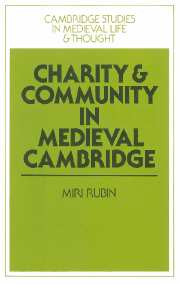Book contents
- Frontmatter
- Contents
- List of tables
- Acknowledgements
- List of abbreviations
- Map
- 1 INTRODUCTION
- 2 THE ECONOMIC BACKGROUND: SUPPLY AND DEMAND FOR CHARITY
- 3 THE IDEA OF CHARITY BETWEEN THE TWELFTH AND FIFTEENTH CENTURIES
- 4 THE CHARITABLE HOUSES OF MEDIEVAL CAMBRIDGE AND ITS SURROUNDINGS
- 5 LIFE IN A MEDIEVAL HOSPITAL: THE HOSPITAL OF ST JOHN, CAMBRIDGE
- 6 THE RELIGIOUS AND ECONOMIC FUNCTIONS OF THE HOSPITAL OF ST JOHN
- 7 CORPORATE AND INDIVIDUAL ACTS OF CHARITY
- 8 EPILOGUE
- Appendix 1 The rule of the hospital of St John the Evangelist, Cambridge
- Appendix 2 The list of masters of the hospital of St John the Evangelist, Cambridge (c. 1207–1507)
- Bibliography
- Index
3 - THE IDEA OF CHARITY BETWEEN THE TWELFTH AND FIFTEENTH CENTURIES
Published online by Cambridge University Press: 28 October 2009
- Frontmatter
- Contents
- List of tables
- Acknowledgements
- List of abbreviations
- Map
- 1 INTRODUCTION
- 2 THE ECONOMIC BACKGROUND: SUPPLY AND DEMAND FOR CHARITY
- 3 THE IDEA OF CHARITY BETWEEN THE TWELFTH AND FIFTEENTH CENTURIES
- 4 THE CHARITABLE HOUSES OF MEDIEVAL CAMBRIDGE AND ITS SURROUNDINGS
- 5 LIFE IN A MEDIEVAL HOSPITAL: THE HOSPITAL OF ST JOHN, CAMBRIDGE
- 6 THE RELIGIOUS AND ECONOMIC FUNCTIONS OF THE HOSPITAL OF ST JOHN
- 7 CORPORATE AND INDIVIDUAL ACTS OF CHARITY
- 8 EPILOGUE
- Appendix 1 The rule of the hospital of St John the Evangelist, Cambridge
- Appendix 2 The list of masters of the hospital of St John the Evangelist, Cambridge (c. 1207–1507)
- Bibliography
- Index
Summary
FORMAL VIEWS OF CHARITABLE OBLIGATIONS
The influence of ideas formulated in the schools on popular religion
One of the most obvious questions about medieval religious culture is the degree to which ordinary folk shared the ideas expressed in academic theological writings. The problem exists not only in the extent of the dissemination of such ideas, but also in the terms applied and the interpretations given in the process of absorption. Most of our evidence for the contents and scope of religious concepts, such as that of charity, is drawn from material written by the learned and not by the poor or their patrons. But in order to recognise the multitude of ways in which ideas progressed and evolved, we must also examine the common man's views which were part of a wide popular culture. Any attempt to assess the ideas of artisans and peasants will be totally distorted if we treat the written cultural creations as accepted and disseminated ubiquitously, successfully and literally. However, two main factors render our quest for a popular idea of charity potentially more fruitful: first, medieval preachers and teachers, being aware of the heterogeneity of their audience and of the problems inherent in the popularisation, simplified and injected life into ideas meant for presentation to the public at large, even at the expense of what they saw as intellectual rigour. Secondly, popular literature, proverbs, humour and verse were wrought into the tools of instruction. Secure in our appreciation of the problems we can attempt a cautious evaluation of charity in its many interpretations by different groups and in different periods.
- Type
- Chapter
- Information
- Charity and Community in Medieval Cambridge , pp. 54 - 98Publisher: Cambridge University PressPrint publication year: 1987



